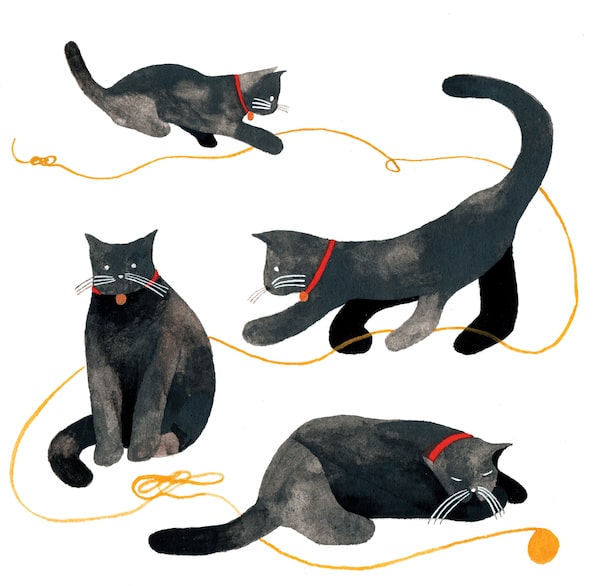
Mary Kirkpatrick/The Globe and Mail
First Person is a daily personal piece submitted by readers. Have a story to tell? See our guidelines at tgam.ca/essayguide.
He arrived in my life at 12 weeks of age, a tiny black kitten, stunted by the effects of a congenital heart condition.
A woman from the SPCA called just after I’d brought him home. “We gave you the wrong kitten.”
“What do you mean, the wrong kitten?” I asked. “I paid for him. I’ve got the paperwork.”
I had to give myself permission to mourn my cat
“We got him mixed up with another black kitten of the same age,” she said. “He has a bad heart murmur and won’t live for more than a year or two. We didn’t intend to adopt him out.”
I remembered how he’d tumbled to the front of a cluster of kittens at the shelter, eager to explore the hand of a stranger. So friendly. He was the one I wanted.
“I’ve chosen this kitten," I replied. "If he only lives a couple of years, well, that will have been his life. I want to keep him.”
“You’ll need to sign some paperwork saying you were informed of his heart murmur,” she said. “He’s got only two years. Maybe five or six if you’re incredibly lucky.”
For the first few days after his adoption, I tried to keep him out of my bedroom at night in the name of uninterrupted sleep, but that went the way of most good intentions. The first evening that I left the door open, he flung himself onto the bed and kept me awake with his eager purring and kneading with needle-sharp claws. It went on for hours, breaking into my dreams. He wanted to be as close to me as he could.
“That’s a horrendous heart murmur,” the vet told me at his first checkup, a few days later. “You don’t even need a stethoscope; you can feel it through the chest wall with your hand. He likely won’t live very long, but apart from that he’s in good shape. A playful little guy.”
It took a week or so to name him, but one day he was sitting at my feet looking up at me and the word popped into my head. “You’re Kismet,” I told him, bending down to scratch the soft fur behind his ears.
Kismet is a word with Turkish and Arabic roots meaning fate or destiny. As he grew to adulthood, I would sometimes look at him and puzzle over what subconscious urge had led me to choose the name. He had become a profoundly ordinary cat, even an annoying one. He continued to disturb my sleep on a nightly basis. He would have panic attacks, urinating all over me and the floor if I tried to put him in a carrier for a trip to the vet. He also developed a neurotic obsession with food. I moved to another city for a couple of years and left him with my housemates, often returning during the holidays. Kismet appeared more bloated each time I came home, growing obese as he devoured the food of the second cat (a finicky eater) as well as his own. As the other cat’s food dish sat on top of the water heater, Kismet would only lose weight when he grew too fat to haul himself onto the adjacent bookshelf and then up to the extra kibble. Thus he yo-yo’d around morbid obesity until I moved him back in with me – and implemented a strict diet, feeding the cats in separate rooms.
Despite his medical issues, Kismet continued to thrive as the years went by. “The cat who lived,” my partner started calling him. Periodically, I wondered about my unconscious name choice, but never really expected an answer. It was probably just a name, I thought.
Ironically, it was his kidneys that were the end of him, not his heart. In the last several months of his life, he became incontinent, struggling to get inside his litter box and often failing, urinating on the towels we’d place on a plastic mat around the box. At first, we cleaned up the towels with irritation, then later with love and pity as he struggled to maintain the patterns of a lifetime as they incrementally slipped away.
More than 15 years after that trip to the SPCA, we arrived at the end of Kismet’s life. It was only then that I realized I was meant to learn much from him – about the bumpy and unexpected road we take through life, moved along by contingency as much as by choice, and about the nature of the complicated bonds of love.
Now that there is a Kismet-sized hole in our lives, I miss his habit of flinging himself into our laps like an awkward child, seeking and giving affection in equal measure, poking with uncontrolled claws, drooling ridiculously, laughable but irresistible in his need to penetrate the busy fog of our days with his immediacy. “Love is here, now!” he always seemed to be saying.
With his passing – a humane drift into his final sleep in front of the fireplace he loved – I understand that Kismet taught me how following someone to the end of their days holds its own magical power to enrich our lives. Love can be awkward and lumpy and strangely shaped, loving perfectly isn’t necessary and true love is paradoxically forged by negotiating the imperfections thrown in its path. The act of living with those imperfections is what forms the warp and weft of love: instead of love existing despite the bumps in its road, those features form the strength of it. To have learned these things now from my funny, clumsy, gentle and loving cat – before it was too late in life for me to understand – that is my kismet.
Louise K. Blight lives in Victoria.